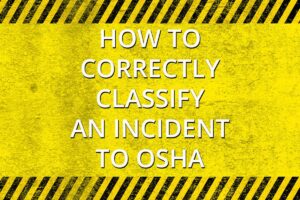The deadline to submit OSHA form 300A is March 2, 2025, for companies with 250 or more workers (or fewer, depending on industry).
Employers must electronically report their data via OSHA’s Injury Tracking Application (ITA). While most of the basics are straightforward, there is one part of the process that leaves the greatest room for error: Incident reporting.
One of the most common issues employers have with their form 300A data is determining whether an incident is recordable, or whether it falls under simple first aid. This can be one of the biggest mistakes employers can make when it comes to injury & incident reporting.
But luckily, it is a mistake you can easily avoid.
How OSHA Defines a Recordable Case
The agency’s recordkeeping regulation includes a section that details exactly what constitutes a medical treatment versus first aid.
This includes:
- Any work-related fatality (this must be reported to OSHA or its state counterpart within 8 hours).
- Any work-related injury or illness that results in loss of consciousness, days away from work, restricted work, or transfer to another job.
- Any work-related injury or illness requiring medical treatment beyond first aid. Note that employers must report any amputation, loss of an eye, or inpatient hospitalization of a worker to OSHA or its state counterpart within 24 hours.
- Any work-related diagnosis of a significant injury or illness by a healthcare professional, such as cancer, chronic irreversible diseases, fractured or cracked bones or teeth, and punctured eardrums.
- There are also special recording criteria for work-related cases involving:
- Needlesticks and sharps injuries
- Medical removal
- Hearing loss
- Tuberculosis
How OSHA Defines First Aid
There’s a common misconception that the distinction between first aid and medical treatment is about who administers the treatment or where it occurs.
But, that’s false. The determining factor is the actual treatment that was given in response to the incident, no matter if it’s by a coworker or ER doctor.
Here are some of the most common examples of first aid:
- Using a non-prescription medication at nonprescription strength (but be careful; for medications available in both prescription and non-prescription form, a recommendation by a physician or other licensed health care professional to use a non-prescription medication at prescription strength is considered medical treatment for recordkeeping purposes)
- Administering tetanus immunizations (other immunizations, however, such as Hepatitis B vaccine or rabies vaccine, are considered medical treatment)
- Cleaning, flushing or soaking wounds on the surface of the skin
- Using wound coverings such as bandages, Band-Aids™, gauze pads, etc.; or using butterfly bandages or Steri-Strips™ (but note that wound closing devices such as sutures, staples, etc., are considered medical treatment)
Don’t Report a “Just in Case” Incident
You may believe that you are simply covering your bases by recording all incidents.
However, adding first aid incidents to your log will artificially inflate your total number of recordable cases. Keep in mind that OSHA uses these figures to target its enforcement efforts. So, this could lead to an increased risk of inspection for your workplace.
Remember to submit your data by March 2, 2025. You can find all forms online here.
**
About Worksite Medical
In most cases, OSHA requires medical surveillance testing, and at no cost to employees.
Worksite Medical makes that program easier with mobile medical testing.
We conduct on-site respirator fit tests, as well as audiometric exams, pulmonary function tests and heavy metal lab work, right on your job site. We also keep accurate, easy-to-access medical records for your convenience. You’ll keep your employees at work, and stay ahead of OSHA inspections.
With Worksite Medical, a mobile medical testing unit — we can bring all the resources of a lab to you. Our certified lab technicians can perform both qualitative and quantitative respirator tests to ensure a perfect fit.
Protect your team and your workplace now with Worksite Medical. Not sure what you need? Try our medical testing wizard here.
Give us a call at 1-844-622-8633, or complete the form below to schedule an on-site visit or to get your free quote!




